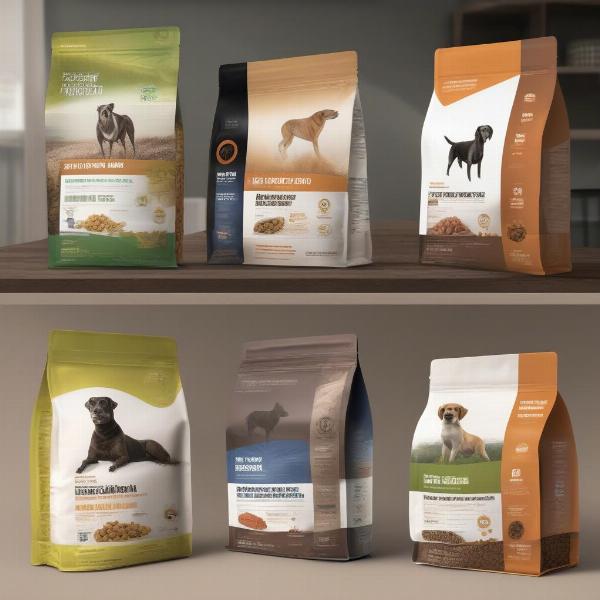Choosing the right food for a dog with a sensitive stomach can be a challenging but crucial aspect of pet ownership. Wholesome dog food designed for sensitive stomachs aims to provide optimal nutrition while minimizing digestive upset. This article will explore the key factors to consider when selecting wholesome dog food for sensitive stomachs, including common ingredients to avoid and beneficial ingredients to look for. We’ll also discuss how to transition your dog to a new food and offer tips for managing their sensitive digestion.
Understanding Food Sensitivities in Dogs
Food sensitivities and intolerances in dogs can manifest in various ways, including vomiting, diarrhea, itchy skin, and ear infections. Unlike food allergies, which involve the immune system, food sensitivities are more about digestive discomfort. Identifying the specific ingredient causing the issue can be tricky, but understanding common culprits is a good starting point.
Key Ingredients to Avoid in Dog Food for Sensitive Stomachs
Some common ingredients that can trigger digestive upset in sensitive dogs include artificial colors, flavors, and preservatives. These additives offer no nutritional value and can irritate the digestive tract. Additionally, certain grains like wheat and corn can be difficult for some dogs to digest. By-products, which are often low-quality ingredients, can also cause digestive problems.
Common Allergens
Common protein sources like beef, chicken, and dairy can also be problematic for some dogs. If your dog consistently experiences digestive issues after consuming these ingredients, consider switching to novel protein sources like lamb, venison, or fish.
Beneficial Ingredients for Sensitive Stomachs
When choosing wholesome dog food for a sensitive stomach, look for easily digestible ingredients like brown rice, sweet potato, and oats. These provide complex carbohydrates for energy without causing digestive upset. Probiotics and prebiotics are also beneficial as they support gut health and can help alleviate digestive issues.
Choosing Novel Protein Sources
 Novel Protein Dog Food
Novel Protein Dog Food
Novel protein sources are proteins that your dog hasn’t been exposed to before, making them less likely to trigger an adverse reaction. These include duck, kangaroo, bison, and even insect-based protein.
Transitioning Your Dog to a New Food
When introducing a new food, it’s important to transition gradually. Start by mixing a small amount of the new food with your dog’s current food. Gradually increase the proportion of new food over several days or weeks until your dog is eating the new food exclusively. This gradual approach helps prevent digestive upset and allows your dog’s system to adjust.
Tips for Managing a Sensitive Stomach
Besides choosing the right food, several other strategies can help manage your dog’s sensitive stomach. Regular exercise, stress reduction, and providing fresh water are essential. Feeding smaller, more frequent meals can also be beneficial.
Conclusion
Choosing wholesome dog food for a sensitive stomach requires careful consideration of ingredients and a gradual transition process. By avoiding common allergens and focusing on easily digestible ingredients, you can help your dog enjoy a comfortable and healthy digestive system. Remember to consult with your veterinarian for personalized advice tailored to your dog’s specific needs.
FAQ
- What are the signs of a sensitive stomach in dogs? Common signs include vomiting, diarrhea, gas, and bloating.
- How do I transition my dog to new food? Gradually mix the new food with the old food over several days or weeks.
- Are grain-free diets always best for sensitive stomachs? Not necessarily. Some dogs do well on grain-free diets, but others may benefit from easily digestible grains like brown rice or oats.
- What are novel proteins? Novel proteins are protein sources that your dog hasn’t been exposed to before, such as duck, venison, or kangaroo.
- Can stress affect my dog’s digestion? Yes, stress can exacerbate digestive issues in sensitive dogs.
- Should I consult a vet about my dog’s sensitive stomach? Yes, it’s always best to consult with a veterinarian to rule out any underlying medical conditions.
- How often should I feed a dog with a sensitive stomach? Smaller, more frequent meals can be beneficial for sensitive dogs.
ILM Dog is a leading international dog care website dedicated to providing expert advice on all aspects of dog ownership. From breed selection and health care to training and nutrition, we offer reliable, practical information for dog owners worldwide. Whether you’re a first-time dog owner or a seasoned expert, ILM Dog has the resources you need to help your furry friend thrive. Contact us at [email protected] or +44 20-3965-8624 for personalized advice.